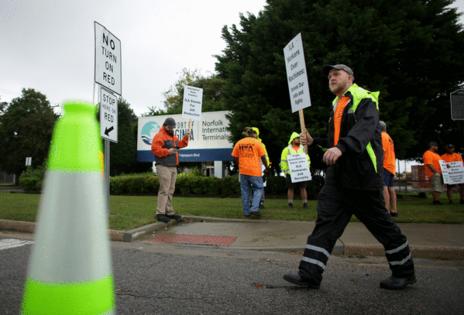The port strike could impact fresh foods first, expert says. A toilet paper shortage is unlikely
Published in Business News
Fears of supply shortages triggered by the strike by the International Longshoremen Association have led to some panic-buying in Hampton Roads, leaving gaps on grocery store shelves reminiscent of the early days of the pandemic.
But experts say the major impacts of a prolonged strike are more likely to be felt elsewhere: the produce aisles.
The strike kicked off at midnight Monday and brought cargo to a standstill at ports from Maine to Texas. The first shortages will be felt in fresh foods such as bananas and other perishables that aren’t grown as much in the U.S., according to Jeff Smith, an economics professor at Virginia Commonwealth University who focuses on supply chain management and analytics.
Those affects could be felt by the end of the week, he said.
“The things that are coming in, especially in the East Coast, that will probably impact people most and most quickly, is food base. It’s the stuff that we get shipped from South America, from Europe,” Smith said. “It’s going to be more seafood oriented, it’s going to be specific types of produce that we don’t produce in the United States.
“Because those things are perishable, that’s what’s going to hit home first because those are very time-sensitive so we have to have those on ships, planned, delivered so they can get distributed out to grocery stores.”
After that, Smith said the public would likely feel a strain in auto parts and other machinery. The Port of Virginia’s primary imports in terms of total tonnage are nuclear reactors and boilers, followed by salt and other minerals, furniture, plastics, and electrical machinery, according to the Virginia Port Authority’s financial report for the year ending June 30. Iron and steel were next.
“COVID did teach us to be redundant in our mechanisms in our supply chain,” Smith said, pointing to pharmaceuticals as an example of an industry that would likely shift to distribution via the West Coast, which will cause an increase in prices for customers.
“(Toilet paper) is a fairly robust supply chain because of what we learned during COVID. So many home shopping patterns changed … so it came down to a common supply that isn’t going to be affected the same way,” he added. “I think food is a bigger scarcity that’s going to be affected, so those prices, especially on fresh food, is probably what’s going to be hit first.”
The Department of Energy said Tuesday the strike will not impact supplies or prices of crude oil, gasoline, natural gas, or other liquid fuel exports or imports.
In a statement provided to media Wednesday by the ILA members picketing in front of the Norfolk International Terminal, the union said the driving force of the strike is the “astronomical” profits their employers have made in recent years while worker wages have been outstripped by inflation.
“Even though the ILA’s members worked tirelessly during the pandemic to ensure that the nation’s commerce flowed and continue to sacrifice time with their own families so that goods can arrive in the homes of other families throughout the world, still, due to corporate greed, employers refuse to compensate the ILA’s membership fairly,” the statement read. “The ILA is fighting for respect, appreciation, and fairness in a world in which corporations are dead set on replacing hardworking people with automation.”
The union calls for provisions that will prevent job losses due to automation and annual wage increases over the 6-year life of the contract. The Associated Press reported that ILA members make a base salary of about $81,000 per year, but some can pull in over $200,000 annually with large amounts of overtime. Both sides have moved off of their initial positions, according to press reports, but it remains unclear when the strike will end.
Once the contract is resolved, Smith estimated it would be about seven to 10 days for the supply chain to be back to normal.
“They know how to make this time up,” he said.
Late Tuesday, Virginia Gov. Glenn Youngkin called on President Joe Biden to intervene in the contract negotiations under the Taft-Hartley Act. Biden has so far declined, though he did intervene to prevent a railroad worker strike in winter of 2022.
“The well-being of Virginia and American workers, as well as the health of our economy, depends on a swift resolution to this strike,” Youngkin said. “A failure to lead will only drive-up prices, disrupt trade, and exacerbate the challenges already faced by Virginians and Americans.”
©2024 The Virginian-Pilot. Visit at pilotonline.com. Distributed by Tribune Content Agency, LLC.












Comments